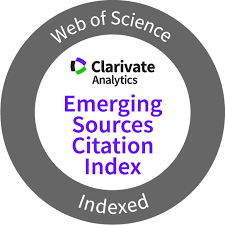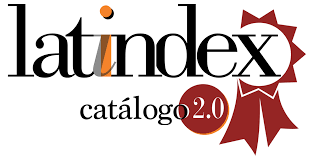Novas estratégias comunicacionais diante da pandemia de Covid-19: reflexões sobre o papel público da comunicação organizacional / New communication strategies in the face of the Covid-19 pandemic: reflections on the public role of organizational comm.
DOI:
https://doi.org/10.5783/revrrpp.v11i21.697Palabras clave:
Comunicação Organizacional, Interesse Público, Covid-19.Resumen
Este estudo propõe refletir sobre o papel público da comunicação organizacional ao assumir estratégias comunicacionais que podem gerar impacto de interesse público diante da pandemia de Covid-19. Como perspectiva teórica abordamos a relação entre as organizações e a sociedade a partir da comunicação organizacional. No procedimento metodológico realizamos uma pesquisa bibliográfica, uma pesquisa documental e a análise do discurso midiático e aspectos dialógicos do "Todos pela Saúde". Os resultados sugerem que estratégias comunicacionais de interesse público possuem capacidade para impactar a sociedade.
Palavras-chave: Comunicação Organizacional, Poder Organizacional, Impacto Público das Organizações Empresariais, Interesse Público, Covid-19
Abstract
The Covid-19 pandemic impacted many social spheres and demanded immediate transformations in society. Organizations needed to reinvent themselves quickly in several aspects, such as their internal practices, as well as in the way of relating to their various publics. This evidenced the interdependence between business organizations and society, requiring them to act for collective interests. In view of this, it is observed that these organizations are assuming a public character, being important to think about how they get involved with society and what are the impacts for social, political, cultural and economic realities. For this, organizational communication has an important role because it is able to act in the public sphere with regard to the promotion of debates that can impact collective attitudes, considering that organizations occupy a strategic position to direct issues that influence social behavior. As a communicative phenomenon, they disseminate ideas, values, and information that influences society, mainly because of their centrality in the daily lives of individuals. So, facing the pandemic scenario, there are numerous corporate actions that aim to serve the public interest, such as the initiative “Todos pela Saúde” (All for Health), an alliance between several organizations. This initiative was chosen as the object of study for contributing to the objective of this paper: analyzes the public role of organizational communication by assuming that communication strategies can generate an impact on public interests in face of the Covid-19 pandemic. The movement aims to mitigate the effects caused by the virus by supporting public health actions promoted by SUS (“Sistema Único de Saúde”- Health Unic System), contributing with solutions and financial support to the public authorities. The “Todos pela Saúde” is coordinated by a group of specialists from the health area that guide the decisions to be made to face the virus with scientific basis. Therefore, as a methodological procedure was adopted three ways: a bibliographic research aiming to investigate about the role of the communications from private organizations in the pandemic context; a documentary research of the “All for Health” medias; and the media discourse analysis (Charaudeau, 2005; 2006) and the dialogic aspects (Bakhtin, 2002; 2003) from the material released by the Initiative. As part of the results, it is observed that the strategies used, at least from the point of view of organizational communication, were innovative in producing something new in their narratives, because the organizations adopted a unison speech in favor of fighting the virus without political or commercial interest. Another highlight is the language strategies used, which seek to value the public in the enunciative act. The consequence is an unusual gender in organizational communication, the educative one. Undoubtedly, it is not possible to ignore the marketing objectives from this Initiative. However, it is important to understand organizational communication as a phenomenon of collective construction and reconstruction that influences the individuals, as well as guide the formation of society. This study provides significant reflections about the public impact of organizational communication for the collective interest, especially regarding the current Covid-19 pandemic.
Keywords: Organizational Communication, Organizational Power, Public Impact of Business Organizations, Public Interest, Covid-19
Descargas
Citas
ANDRELO, R. y KERBAUY, M.T. (2009). Gênero educativo no rádio: parâmetros para a elaboração de programas voltados à educação. Revista Brasileira de Ciências da Comunicação, 32(2),147-164. http://dx.doi.org/10.1590/rbcc.v32i2.264
BAKHTIN, M. (2002). Marxismo e filosofia da linguagem: problemas fundamentais do método sociológico na ciência da linguagem. São Paulo: Annablume, Hucitec.
BAKHTIN, M. (2003). Estética da criação verbal. Tradução de Paulo Bezerra. 4ªed. São Paulo: Martins Fontes.
BALDISSERA, R., SARTOR, B. Y ROSSATO, J. (2016). Comunicação e interesse público: a triangulação “iniciativa privada – poder público – comunidade”. ALCEU, 16 (32), 207-224. Recuperado el 31 de marzo de 2021, de http://revistaalceu-acervo.com.puc-rio.br/media/pp%20207-224.pdf
BALDISSERA, R. y STOCKER, P. (2015). Comunicação organizacional e ethos discursivo: estratégias para falar de si nos anúncios dos bancos. En Marques, A. C. S. y Oliveira, I. L.. Comunicação Organizacional: dimensões epistemológicas e discursivas (146-162). Belo Horizonte: FAFICH/UFMG.
CARARETO, M., ANDRELO, R. Y RUÃO, T. (2020). O impacto da comunicação organizacional na sociedade: reflexões iniciais a partir da percepção de gestores em agências de comunicação. En Anais do XIV Congresso Abrapcorp. Recuperado el 17 de junio de 2021, de https://abrapcorp2.org.br/site/manager/arq/(cod2_23209)Artigo_Abrapcorp_2020__Mariana_Carareto.pdf
CHARAUDEAU, P. (2005). Problemas de análise das mídias. En Meditsch, E. (Coord.) Teorias do rádio: textos e contextos (vol. I). Florianópolis: Insular.
CHARAUDEAU, P. (2006). Discurso das mídias. São Paulo: Contexto.
COOREN, F. et al. (2011). Communication, Organizing and Organization: An Overview and Introduction to the Special Issue. Organization Studies, 32 (9),1149-1170. https://doi.org/10.1177/0170840611410836
EDELMAN (2020). Trust Barometer 2020: Trust and the Covid-19 Pandemic. Recuperado el 31 de marzo de 2021, de https://www.edelman.com.br/estudos/edelman-trust-barometer-2020-update-confianca-e-pandemia-de-covid-19
FULK, J. (2014). Communication and Organization-society relationship. En Putnam, L. L. y Mumby, D. K. The Sage Handbook of Organizational Communication: Advances in Theoty, Research, and Methods, 3ªed. (pp. 689-694). USA: Sage Publications.
IHLEN, Ø. y VERHOEVEN, P. (2017). Organization-society relationship. En Scott, C. R. et al. (Coords.). The International Encyclopedia of Organizational Communication. John Wiley&Sons.
JACQUINOT, G. (1977). Image et pedagogie: analyse sémiologique du film à intention didatique. Paris: Presses Universitaires de France.
KOSCHMANN, M. (2012). What is Organizational Communication? United States: Department of Communication, University of Colorado Boulder. Recuperado el 17 de junio de 2021, de http://docs.wixstatic.com/ugd/740670_369364a68a154f929ed9cce8d15b4727.pdf
LIMA, F. P. y MAIMONI, H. L. (2012). Comunicação integrada: Perspectivas e desafios. En Lima, F. P. y Oliveira, I. de L. Oliveira (Coords.). Propostas conceituais para a comunicação no contexto organizacional (pp.95-105). São Caetano do Sul, SP: Difusão; RJ: Editora Senac Rio.
LIMA, F. P. y OLIVEIRA, I. DE L. (2014). O discurso e a construção de sentido no contexto organizacional midiatizado. En Marchiori, M. (Coords.). Contexto organizacional midiatizado (85-97). São Caetano do Sul, SP: Difusão.
MUMBY, D. K. y Stohl, C. (1996). Disciplining Organizational Communication Studies. Management Communication Quarterly, 10 (1), 50-72. https://doi.org/10.1177/0893318996010001004
OLIVEIRA, I. De L. y PAULA, M. A. (2010). Interações na contemporaneidade e mudanças paradigmáticas: organização, comunicação e estratégias. Revista del Foro Iberoamericano sobre Estrategias de Comunicación, a.V, 14, 31-51. Recuperado el 31 de marzo de 2021, de http://www.cienciared.com.ar/ra/usr/9/1016/fisec_estrategias_n14m1pp31_51.pdf
PUTNAM, L. L. y Mumby, D. K. (2014). Introduction: Advancing Theory and Research in Organizational Communication. En Putnam, L. L. y Mumby, D. K.. The SAGE Handbook of Organizational Communication, 3ºed. (pp.1-18). USA: Sage Publication.
RUÃO, T. (2016). A organização comunicativa: teoria e prática em comunicação organizacional. Braga, Portugal: CECS-Uminho.
SARTOR, B. A. (2018). O poder corporativo na perspectiva da democracia e do interesse público. En MANIERI, Tiago; MARQUES, Ângela. Comunicação e poder organizacional: enfrentamentos discursivos, políticos e estratégicos (pp.138-152). Goiânia: Gráfica UFG.
SAUERBRONN, F. F. y SAUERBRONN, J. F. R (2011). Estratégias de responsabilidade social e esfera pública: um debate sobre stakeholders e dimensões sociopolíticas de ações empresariais. Revista de Administração Pública, 45 (2),435-458. Recuperado el 31 de marzo de 2021, de https://www.scielo.br/pdf/rap/v45n2/07.pdf
VAN RULER, B. y VERCIC, D. (2003). Perspectivas europeias das relações públicas. Comunicação & Sociedade, 24 (39), 155-172. Recuperado el 31 de marzo de 2021, de https://www.metodista.br/revistas/revistas-ims/index.php/CSO/article/view/4842/4092
VAN RULER, B. y VERCIC, D. (2005). Reflective Communication Management, Future Ways for Public Relations Research. Annals of the International Communication Association, 29, 239-274. https://doi.org/10.1080/23808985.2005.11679049.
ZOLLER, H. M. (2014). Power and Resistance in Organizational Communication. En Putnam, L. L. y Mumby, D. K. The SAGE Handbook of Organizational Communication (3ºed.,595-618). USA: Sage Publication.
Descargas
Publicado
Cómo citar
Número
Sección
Licencia
Los autores que publican en esta revista están de acuerdo con los siguientes términos:- Los autores conservan los derechos de autor y garantizan a la revista el derecho de ser la primera publicación del trabajo al igual que licenciado bajo una Creative Commons Attribution License que permite a otros compartir el trabajo con un reconocimiento de la autoría del trabajo y la publicación inicial en esta revista.
- Los autores pueden establecer por separado acuerdos adicionales para la distribución no exclusiva de la versión de la obra publicada en la revista (por ejemplo, situarlo en un repositorio institucional o publicarlo en un libro), con un reconocimiento de su publicación inicial en esta revista.
- Se permite y se anima a los autores a difundir sus trabajos electrónicamente (por ejemplo, en repositorios institucionales o en su propio sitio web) antes y durante el proceso de envío, ya que puede dar lugar a intercambios productivos, así como a una citación más temprana y mayor de los trabajos publicados (Véase The Effect of Open Access) (en inglés).




